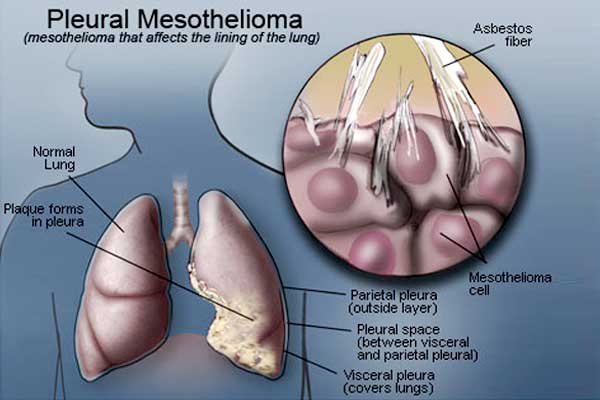Mesothelioma is a cancerous growth that affects the lining of the chest or abdomen. The most common form of Mesothelioma is Pleural Mesothelioma, where the cancer growths form on the pleura, the sac position on the chest that protects the lungs. Other forms of Mesothelioma interfere with the peritoneum (belly button lining) and the pericardium (which lines around the sympathy).
Causes of Mesothelioma
There is extensive and indisputable medical evidence that Mesothelioma is caused by exposure to asbestos fibers. There is no other known cause.

Asbestos is a naturally occurring fiber material that has been widely used throughout the 20th century in industrial, commercial and domestic products. It was especially popular due to its durability, fire resistance, and insulating properties. It was used in several thousand different products, including building materials, household appliances, and brake pads; the use of which was so widespread that millions of people in the UK were unknowingly exposed to the toxic material, leading to the development of Mesothelioma among millions of people in the UK.
How does asbestos cause Mesothelioma?
The internal organs and body cavities are surrounded by a thin tissue, known as the mesothelium. This lining covers the lungs and also lines the pericardium and the peritoneum. This mesothelial tissue provides protection and support for the internal organs and body cavities. It also provides lubrication for the organ to function properly. Mesothelioma affects this lining.
Symptoms of Mesothelioma
The following are some of the symptoms of Mesothelioma:
- Shortness of Breath caused by fluid trapped between the lungs and the chest wall.
- Chest pain is also caused by fluid trapped between the lungs and the chest wall that creates a pressure that a patient experiences as chest pain under the rib cage and/or accompanied by a cough These are often the first Mesothelioma symptoms that patients are aware of, which occur long before the others.
- Weight Loss is often associated with cancerous tumors, particularly if the tumors are larger.
- Abdominal Pain and/or Swelling resulting from fluid buildup in the abdomen.
- Bowel Obstruction can be a complication resulting from fluid buildup in the abdomen causing complications with the digestive tract and associated organs. Tumors that form in the abdominal region can also cause this symptom.
- Anemia can be a symptom of Mesothelioma affecting the tissues of the lungs and the thoracic cavity, the pleura.
- Blood coagulation abnormalities can occur but generally only in severe Mesothelioma cases.
- Difficulty in swallowing: If asbestos cancer (Mesothelioma) has metastasized from Mesothelioma to other parts of the body, swallowing problems may occur.
- Swelling in the neck or face.
Mesothelioma stages
The four stages of Mesothelioma are as follows:
- Stage I:
At this stage, the presence of Mesothelioma is on the right side or the left side of the pleura (lung). It can also be in the pericardium or diaphragm.
- Stage II:
At this stage, the disease spreads to the other side of the pleura or to the esophagus, heart or chest wall or even the lymph nodes.
- Stage III:
The disease has now spread into the peritoneum – the abdominal cavity lining. This stage may also include the lymph nodes outside the breast.
- Stage IV:
This is the final stage of Mesothelioma, with the disease spreading to the other organs through the blood.
Mesothelioma treatment options
The following are the treatment options for Mesothelioma.
- Surgical
Surgical Mesothelioma treatment consists of three main forms: diagnostic surgery, curative surgery, and palliative surgery. Diagnostic and palliative surgeries provide symptomatic relief. Only curative surgery may possibly remove the cancer from the patient.
- Chemotherapy
Chemotherapy consists of intravenous injection of a substance that kills both healthy and cancerous cells. However, there is a relatively new treatment called “heated chemo” which doesn’t destroy the rapidly dividing non-cancerous cells. This option is usually given after surgery.
- Radiotherapy
Radiation therapy, which is often used in parallel with surgery, is used to kill the cancer cells and prevent them from spreading. It can also be used as a stand-alone treatment or used post-surgery.
- Photodynamic therapy
Photodynamic therapy is used to eradicate cancer cells by exposing them to a specific type of light and is considered to be highly specialized and more specific for skin cancer and a few lung cancers.
- Gene Therapy
Gene therapy is to genetically manipulate the malignant cells by introducing a non-infectious virus. The invader causes the cells to produce a specific protein that interferes with the “suicide” phenomenon of cancer cells. In addition, the patient is treated with chemotherapy, which kills only the cancer cells. This treatment has shown promising results even though they are still at an experimental stage.
- Immunotherapy
Immunotherapy “boosts” the patient’s immune system to help recognize and destroy the cancer cells on its own.
Mesothelioma Prognosis
Prognosis for Mesothelioma depends on the timing of diagnosis and the treatment given. The longer it takes to diagnose Mesothelioma and the longer it takes for treatment to start, the slimmer chances of survival. The problem is that Mesothelioma is somewhat difficult to diagnose early, as symptoms can be nonspecific, resulting in treatment starting at a later stage.
Determining the factors that lead to the prognosis?
Early detection of the disease is essential but due to the deceptive nature of subtle symptoms, such as a simple cough, this isn’t common.
